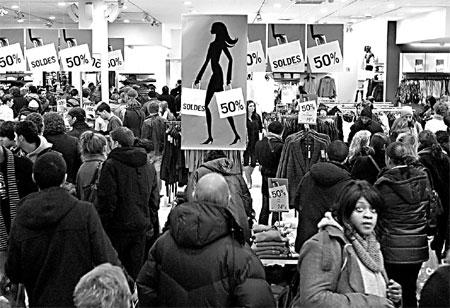
People shop on the opening day of the Grand Sales in Paris, France on Jan 7, 2009. Bloomberg News
Marie Laure Delaunay is so worried about the future, she went on a shopping spree during the recent "Soldes," or "Grand Sale" in France.
"I'm buying more now because I'm preparing for the crisis," said the 58-year-old jewelry designer, dipping into piles of marked-down jackets at a Zara store near the Opera in central Paris as she sought bargains in the sale. "Things will get worse, so I'm buying lots of spring clothes. That way, I won't need to spend money later."
With the French economy heading into its biggest contraction since World War II, shoppers took advantage of discounts of as much as 80 percent. For President Nicolas Sarkozy that's a mixed blessing: While it may boost current consumer spending, which accounts for 57 percent of the economy, it shows purse strings will be tightened as the French turn increasingly pessimistic.
Consumers were left out of Sarkozy's 26 billion euro economic stimulus package that focuses on corporate and infrastructure investment. More than a million people took to the streets in protests last month, asking the government to boost the minimum wage and step up spending on households. Worse may be in store, some economists say.
"The job market has only started to deteriorate, with the end of temporary contracts for workers whose contribution to spending has never been very strong," said Gilles Moec, an economist with Bank of America Merrill Lynch in London. "Going ahead, it's the heart of the labor market that's going to be hit and consumer spending is really going to take a blow."
Last hurrah
Consumers stocked up in January, leading French retail sales to rise for the first time in four months, the Bloomberg purchasing managers' index showed. The French Fashion Institute estimates sales of textile and footwear rose by up to 5 percent from a year ago in the first two weeks of the Grand Sale that started on Jan 7.
"I am really surprised how good the sales are," said Celine Perrin, a saleswoman at a Promod store in Paris as she surveyed women rummaging through clothes. "I'm worried demand will drop brutally after we introduce the spring collection."
Shopkeepers say the five-week government-determined discount period may be the last hurrah before consumer blues set in as employers from carmaker Renault SA to mining company Rio Tinto Plc announce job cuts. France had 217,000 more jobseekers in 2008, half of them in the last two months.
The European Commission expects the French economy, the second-largest of the 16 countries sharing the euro, to contract 1.8 percent this year, mirroring the region's recession. It sees France's unemployment rate at 9.8 percent this year and 10.6 percent next year, from 7.7 percent in the third quarter.
Larger discounts
A slump in French consumption doesn't bode well for the rest of Europe. While France accounts for 21 percent of the euro region's gross domestic product, it has contributed 31 percent of the consumer-spending growth since 2001, said Moec.
Outlets from Galeries Lafayette's landmark store on Boulevard Haussmann in central Paris to small boutiques offered price cuts as high as 50 percent from the first day of sales, compared with discounts of 30 percent or less in the previous years. Prices were subsequently cut by as much as 80 percent.
"I am buying more this year because the discounts are really good," said Aude Lefeuvre, a 17-year-old beauty school student looking for trousers in a Mango store.
Attractive prices helped push January sales at big department stores up 8 percent from the same period a year earlier, said Union de Commerce de Centre Ville, a business trade body that counts Galeries Lafayette and the Monoprix supermarket chain among its members.
Consumer protest
"It's about the same growth as last year, which, considering the state of the economy, is pretty spectacular," said Claude Boulle, chairman of the group. "Store owners are worried about what's going to happen after the Grand Sale."
Consumer spending could slide even if prices head south as people save more, economists said. Diminished purchasing power was the centerpiece of the one-day nationwide strike on Jan 29, with unions demanding government efforts to boost incomes and aid consumers.
The protest was the biggest since Sarkozy's May 2007 election. The opposition Socialists are demanding 50 billion euros of spending, including a 1-point reduction in the 19.6 percent value-added sales tax and a payout of 500 euros each to 9 million low-income workers and welfare recipients.
In a nationwide television interview on Feb 5, Sarkozy defied calls for more aid to consumers, saying his stimulus plan to spur investment will cushion a deepening economic slump.
Even direct aid to consumers might not do the trick as people faced with an uncertain future hoard their cash, Moec said. The Organization for Economic Cooperation and Development forecasts that French household savings, at 13.3 percent of GDP, will be the highest among 23 of the member countries this year.
Retailers worry the French will seek shelter in frugality.
"We are really feeling the effects of the financial crisis," said Sonia Niare, head saleswoman at Un Jour Ailleurs, a clothes and accessories store. "I think this year will be very difficult."





